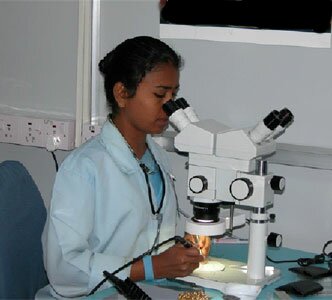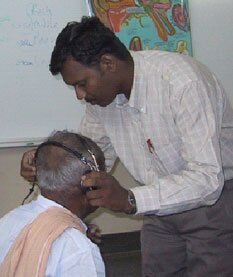| Recent Milestones |
|
" Currently manufacturing Impact 1, Project Impact's proprietary digitally programmable analog hearing aid at Aurolab in India.
" FDA and CE Mark Certification complete for Impact 1, demonstrating that our product fulfills the same quality regulatory standards required for developed country sales.
" Sales in India have begun, further development of sales channels worldwide are underway
|
The mission of the Affordable Hearing Aid Project (AHAP) is to alleviate the burden of hearing impairment in as large a population as possible, regardless of the recipients' ability to pay.
The continuing support of our partners has made the Affordable Hearing Aid Project possible. Impact Foundation UK and the Impact Federation, Acumen Fund, Al Noor Foundation, Aravind, Aurolab, Ashoka, Lions Clubs International Foundation, Social Profit Network, Schwab Foundation for Social Entrepreneurship, the World Bank Development Marketplace as well as individual donors, have all offered invaluable support.
Untreated hearing loss profoundly impairs an individual's quality of life, decreasing independence, prospects for employment, opportunities for education, and straining social and family life. In children, hearing loss can be even more devastating, impairing language acquisition, stunting education, and crippling social development. In developing countries especially, hearing impaired people and their families are more likely to live in poverty. It is a two-way relationship -- the disability adds to the risk of poverty (hearing impaired individuals command far lower wages on average), and conditions of poverty (including lack of formal education and proper nutrition) increase the risk of hearing impairment.
The WHO estimates that 250 million hearing impaired people world wide could benefit from using a hearing aid. Despite the overwhelming need for hearing aids, total worldwide sales in 2002 were 6 million units, only 12% of which were sold to the developing world where 70% of the global population lives. Even if sales were more evenly distributed geographically, those 6 million units cover less than 20% of the global need for 32 million new units annually. The vast majority of hearing loss is untreated throughout the world. Even in the US , 28 million people would benefit from the use of a hearing aid, but under 23% of them own a hearing aid and 7 million cannot afford to purchase one. Even in the richest country on earth, many people who need a hearing aid cannot afford one.
Like eyeglasses, high quality hearing aids must be prescribed to fit an individual's particular sensory impairment. Project Impact's first product, Impact 1, is a digitally programmable analog hearing aid which can be programmed to fit mild to moderately severe hearing losses. The instrument features two independent channels and two user selectable program memories. Similar hearing aids wholesale in the US for around $800  and retail for around $1500. The Impact 1 will have wholesale prices ranging from $60 to $210, and will retail according to the patient's ability to pay, where “free” will be the lowest price. and retail for around $1500. The Impact 1 will have wholesale prices ranging from $60 to $210, and will retail according to the patient's ability to pay, where “free” will be the lowest price.
Project Impact is able to further control costs through its partnership with Aurolab, an Indian non-profit manufacturer of quality medical devices. Production of affordable hearing aids became operational in January 2003.
 Project Impact employs a low margin, high volume approach to keep end user pricing low while sustaining operations from user fees. Project Impact further increases the accessibility of hearing aids through a multi-tiered pricing model. Retail pricing of Impact 1 varies from market to market such that surplus revenue from wealthier markets cross-subsidizes products and services for lower income markets. Sales within a particular region similarly use profits from wealthier customers to offset losses from poorer customers. The same model has been used in affordable eye care service delivery models with spectacular success. Project Impact employs a low margin, high volume approach to keep end user pricing low while sustaining operations from user fees. Project Impact further increases the accessibility of hearing aids through a multi-tiered pricing model. Retail pricing of Impact 1 varies from market to market such that surplus revenue from wealthier markets cross-subsidizes products and services for lower income markets. Sales within a particular region similarly use profits from wealthier customers to offset losses from poorer customers. The same model has been used in affordable eye care service delivery models with spectacular success.
The Impact 1 distribution model includes both the creation of new, independent distribution centers and the social franchising of distribution partners in developing countries. The first independent distribution site initiated operations in May 2003 in Madurai , India with 13 employees. This pilot site, funded by and in partnership with Lions Clubs International Foundation uses a multi-tiered pricing to make hearing aids accessible to even the poorest patient.
Project Impact is further promoting the distribution of the Impact 1 through socially franchised partnerships with other non-profit organizations already working in the fields of health care, disability, and hearing impairment. Working with established organizations provides several advantages, including access to local expertise, faster market penetration, expanded reach to intended beneficiaries, increased job creation, and expansion of the project's ability to raise start-up funds from a broader base of stakeholders. Building this wider distribution base ensures that Project Impact meets the necessary high volume/low margin objectives.
To date, Project Impact has established manufacturing; established first distribution sites; created an inventory for 11,000 hearing aids; conducted one clinical trial; developed training programs; and achieved regulatory approvals, such as CE Mark.
|
